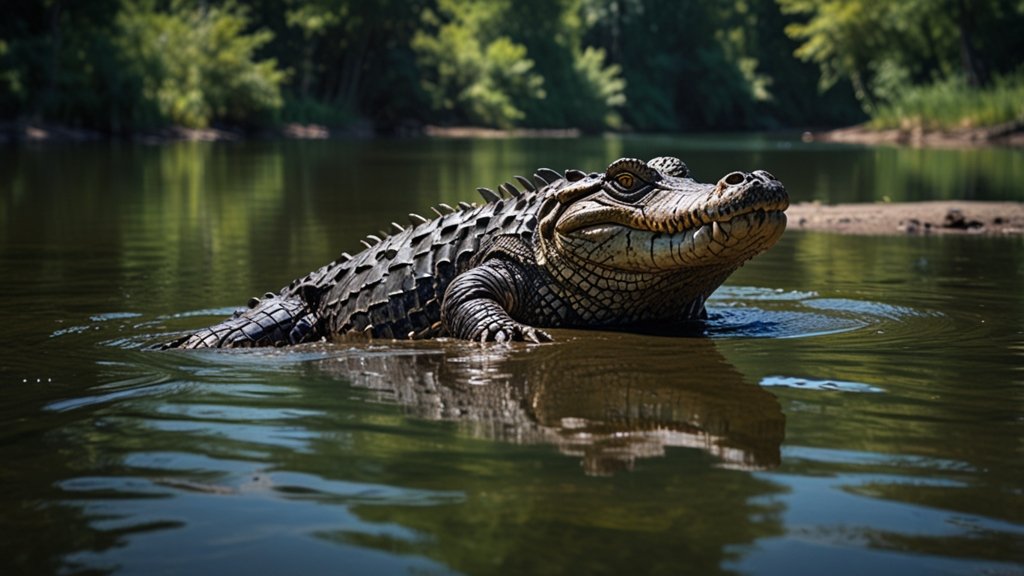Kensington Metropark, a beloved Michigan recreation area known for its serene Kent Lake and abundant wildlife, faced an unprecedented event in May 2024. A visitor reported spotting something astonishingly out of place: a potential alligator gliding through the park’s waters. This report triggered immediate concern and launched a multi-agency investigation into the unlikely presence of a reptile native to the warm swamps of the southeastern United States, not the temperate Great Lakes region.
The Initial Report and Immediate Response
According to park officials, the visitor’s account described a creature resembling an alligator near the Kent Lake boat launch. Crucially, American alligators (Alligator mississippiensis) are not native to Michigan. Consequently, authorities treated the sighting with utmost seriousness. Within hours, the Michigan Department of Natural Resources (DNR), the Detroit Zoological Society, and the Huron-Clinton Metroparks Police initiated a coordinated search effort. Teams employed boats, drones, and shoreline patrols, meticulously scanning the lake and surrounding marshes.
Why an Alligator in Michigan is Alarming
The core issue lies in fundamental environmental mismatch. Michigan’s climate and ecosystem are utterly unsuitable for alligators. These cold-blooded reptiles require consistently warm water (above 82°F/28°C) to survive, especially year-round. Michigan winters, with their deep freezes and ice-covered lakes, are invariably fatal. Furthermore, introducing a large, non-native apex predator poses severe risks:
- Ecological Disruption: Alligators could prey on native fish, birds, turtles, and mammals, destabilizing the local food chain.
- Public Safety Threat: While generally avoiding humans, alligators can become aggressive if cornered, fed, or defending territory.
- Animal Welfare: A released pet faces a slow, stressful death from starvation or cold.
Table: Native Habitat vs. Michigan Conditions for American Alligators
| Factor | Native Habitat (Southeastern US) | Kensington Metropark, MI | Suitability for Alligator |
|---|---|---|---|
| Winter Temperatures | Mild, rarely freezing for long | Harsh, sub-zero common | ❌ Lethal |
| Summer Water Temp | Consistently warm (often >82°F/28°C) | Moderates, fluctuates | ⚠️ Marginal in peak summer |
| Natural Prey Base | Abundant fish, turtles, mammals | Different species present | ⚠️ Unknown compatibility |
| Overwintering Ability | Access to warm springs/mud holes | Frozen lakes, deep snow | ❌ Impossible |
The Extensive Search and Public Precautions
Despite intensive efforts over several days, no physical evidence—tracks, scat, or the animal itself—was found. “We deployed significant resources,” stated a DNR spokesperson, “including thermal imaging and expert herpetologists. Ultimately, we found no confirmation of an alligator.” Meanwhile, park management acted proactively. They installed prominent warning signs around Kent Lake, advising visitors to exercise caution near the water’s edge, keep pets leashed, and immediately report any unusual sightings. The Metroparks Police established a dedicated hotline: 810-227-8910.
The Likely Origin: Illicit Pet Release
Authorities overwhelmingly suspect the sighting, if valid, stemmed from someone illegally releasing a pet alligator into the lake. Sadly, this is a recurring problem nationwide. People acquire juvenile alligators, often impulsively or illegally, only to abandon them when they become large, dangerous, and expensive to house. Michigan law strictly prohibits possessing alligators without special permits, and releasing any non-native animal into the wild is illegal and ecologically destructive.
Table: Agencies Involved in Kensington Alligator Search & Response
| Agency | Primary Role | Key Actions Taken |
|---|---|---|
| Huron-Clinton Metroparks | Park Management & Visitor Safety | Posted warning signs, managed public communication |
| Metroparks Police | Law Enforcement & Initial Response | Fielded reports, coordinated patrols, public hotline (810-227-8910) |
| MI DNR (Dept. Natural Resources) | Wildlife Management & Law Enforcement | Led search operations, provided wildlife expertise |
| Detroit Zoological Society | Expert Animal Handling & Identification | Assisted with search techniques, species verification |
Broader Implications: The Exotic Pet Problem
The Kensington incident highlights a critical national issue: the exotic pet trade and irresponsible ownership. Many exotic animals, purchased when small and manageable, quickly outgrow their enclosures and their owners’ ability to care for them. Releasing them into local parks or waterways is never a humane or legal solution. It endangers the public, devastates local ecosystems, and almost guarantees a painful death for the animal. Organizations like the Michigan DNR emphasize that surrendering unwanted exotic pets to licensed sanctuaries or authorities is the only responsible course of action.
What Visitors Should Do
While the Kensington alligator remains unconfirmed, the protocols are clear. If you ever see a large, unusual reptile in a Michigan park:
- Do NOT approach, corner, or attempt to feed it. Keep a safe distance.
- Observe details: Note its size, color, location, and behavior from a safe vantage point.
- Report immediately: Call local law enforcement or the Metroparks Police hotline at 810-227-8910. Importantly, if you get your alligator sighting kensington metropark report in quickly, authorities can respond faster, enhancing public safety.
Conclusion: Vigilance and Responsibility
The May 2024 alligator sighting kensington metropark report, though unverified, triggered a swift and thorough response demonstrating Michigan’s commitment to public safety and ecological protection. While extensive searches found no alligator, the incident serves as a crucial reminder. It underscores the dangers of the exotic pet trade and the irreversible harm caused by releasing non-native animals into the wild. Visitors to Kensington Metropark and similar natural areas should remain observant, heed posted warnings, and immediately report any suspicious wildlife activity. Responsible pet ownership and respecting wildlife laws are paramount to preventing such unusual and potentially hazardous situations. The park remains a safe and beautiful destination, but shared vigilance ensures it stays that way for all visitors and native species.
Frequently Asked Questions
- Was an alligator ever actually found in Kensington Metropark?
No. Despite an extensive search involving multiple agencies using boats, drones, and expert trackers, no alligator or any physical evidence confirming its presence (like tracks or clear photos) was ever found. - Why were authorities so concerned about one alligator?
Alligators are dangerous apex predators not native to Michigan. They pose a potential risk to people (especially children and pets), disrupt the local ecosystem by preying on native wildlife, and cannot survive Michigan winters, leading to a slow, inhumane death if released. - Where did the alligator possibly come from if it was real?
Authorities believe the most likely explanation is that someone illegally kept an alligator as a pet and then irresponsibly released it into Kent Lake when it became too large or difficult to manage. - What should I do if I see something that looks like an alligator in a Michigan park?
Do not approach it. Immediately call local law enforcement or the Huron-Clinton Metroparks Police hotline at 810-227-8910. Provide details about the animal’s location, size, and behavior from a safe distance. If you get your alligator sighting kensington metropark report in fast, it helps immensely. - Are the warning signs still up at Kensington Metropark?
Park officials typically remove such precautionary signs after a significant period passes with no further sightings or evidence. However, visitors should always remain observant near water and report any unusual wildlife immediately, regardless of posted signs. Check the official Huron-Clinton Metroparks website for current advisories.
YOU MAY ALSO LIKE: Fort Lauderdale Florida Verenigde Staten: Where Venice Meets the Tropics











